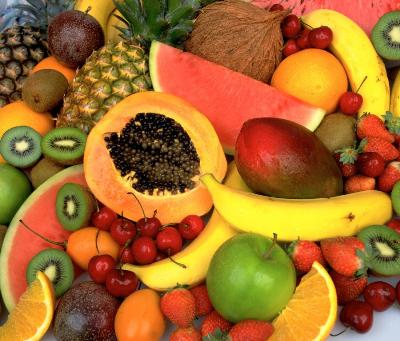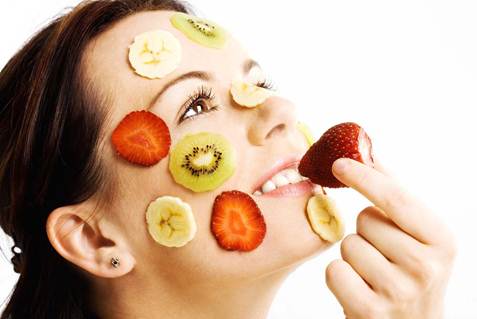
Find
out why there’s melon in your moisturizer
You might not have noticed, but more and more beauty
products these days include fruit, or fruit extracts, among their ingredients.
We all know the benefits of eating lots of fruit, but what are the benefits of
slathering it on our skin? According to Dr. Denise Wexler, president of the Canadian
Dermatology Association, creams with fruits and berries may have various
positive effects; for example, she says, “Vitamin C and Vitamin A derivatives
such as tretinoin and retinol are antioxidants and may improve wrinkles.” We looked
into the products out there and the fruity ingredients they contain that
benefit the skin.
Berry Nice Skin
Given that fruits are being used in products because they
are a rich source of nutrients and have anti-oxidant properties, it makes sense
that cosmetic companies are seeking out those fruits offering the highest
concentrations of those properties. Often, these are the same super fruits
we’re encouraged to eat more of, such as pomegranate and blueberries.
In fact, part of the reason the use of super fruits in skin
care is a growing trend is that consumers are already aware of the benefits of
including them in their diet, so we’re open to seeing them in the products we’re
using, too, and trust that they’ll work well and aren’t just a marketing ploy.
Estee Lauder’s new Nutritious Vita-Mineral Moisture Crème
($46) uses pomegranate, which the company says is “one of the most nutrient
dense fruits ever discovered, rich in energizing vitamins and minerals.” The
product is made using “a process of fermentation and purification to increase
the bio-availability of pomegranate to skin cells,” which, in layman’s terms,
means the nutrients are converted into a form the skin is able to use, and this
rich cream is certainly great at hydrating the skin. Lots of other ranges are
embracing pomegranate, such as Korres and the Body Shop, both of which use it
in a number of different products.
You can actually see the cranberry and pomegranate seeds
incorporated in Avon’s mark brand Berry Grand super. Exfoliating Beads ($12),
which comes as a powder you mix with your cleanser (and is more of a deep
exfoliator than a product you’d use everyday). Ole Henriksen Blue/Black Berry Enzyme
mask ($32) harnesses the fruit enzymes and nutrients to gently exfoliate and
calm the skin.
Then there are the ranges that embrace rare fruit
you’ve
probably never heard of. The extract of acerola, a kind of cherry found
on the Yucatán Peninsula in Mexico, has been shown to have positive
effects on sun-darkened skin and
is being used by a number of cosmetic companies, including the high end
brands
Dr. Hauschka and Elemis, as well as in various Neutrogena products
formulated
to deal with skin issues ranging from acne to discolouration.
The Éclos range (from Shoppers Drug Mart) uses stem cells
from the Utt-wiler. Spatlauber, a rare Swiss Apple “that showa tremendous
ability to stimulate skin stem cells, encouraging aging skin to behave like
younger skin,” according to the manufacture. (Éclos Night Booster Fluid
($19.99) is a very light-feeling cream that does seem to tighten the skin from
first use, and smells lovely.)
The
Natural Versus Chemical Debate

It might be tempting to think that, because a product uses
fruit in its ingredients, it must be more natural or in some way better for
you. This isn’t necessarily true. “there ‘s no scientific data to support that
these are any more effective than other creams containing other antioxidants or
other chemicals used to minimize wrinkles,” Wexler says.
Paula Begoun, author of Don’t go to the Cosmetic Counter
Without Me, says that a fruit base can be good or bad. “For example, lemon
oil is a known skin irritant, but melon extract is a rich source of vitamins A,
C, and a wide range of various anti-oxidant compounds,” she says.
As with anything you buy, you can’t necessarily trust the
claims made on the packaging of all products. “Some cosmetics lines make a big
deal about calling out a certain ingredient that they want you to believe is
special, but it’s important to pay attention to the research surrounding that
ingredient, and how much of it is used in the product,” she warns. Ingredients
are listed in order of most used to least, and if a given ingredient is way
down at the bottom of the list, you won’t be getting much benefit from it.
For companies that pride themselves on being more natural,
such as The Body Shop and Lush, fruity products take pride of place on their
shelves and each one does actually include fruit close to the top of the
ingredient lists. The Body Shop recently launched it’s Delipscious Lip Colours
($12), which are create from 100 per cent food grade ingredients, including
fruit seed oils to nourish lips (they feel wonderful on, and taste great).
Lush has products like the divine smelling I love Juicy
shampoo ($29.95), which lists a symphony of quite acidic fruits (kiwi,
pineapple, mango, or ange, papaya, and lemon), which help thoroughly cleanse
greasier hair. At Lush, it isn’t jut about using an extract; the company tries
to utilize whole fruit wherever possible, “which is infinitely more beneficial
than isolating a property more beneficial than isolating a property and
removing it from a fruit, vegetable, or natural material and adding it to a
cosmetic product to try and recreate it’s function,” says Helen Ambrosen, Lush
co-founder and product developer.
Whether you choose to believe that nutrients derived from
fruits are better for you, or more effective, than those produced in a lab is a
matter of whether you buy into the general concept that natural is better. Even
fruit extracts may have gone though a lot of chemical processes before actually
being added to a product, unless you’re choosing from an organic/natural
product line. The proof, as always, is in the pudding, so have fun trying out
all the wonderful fruit-based products out there and determining which ones
work best for you.